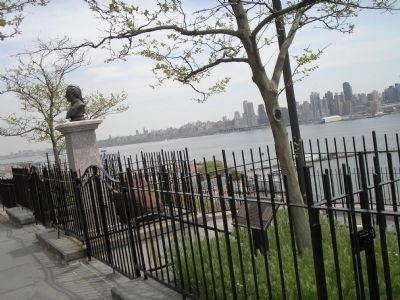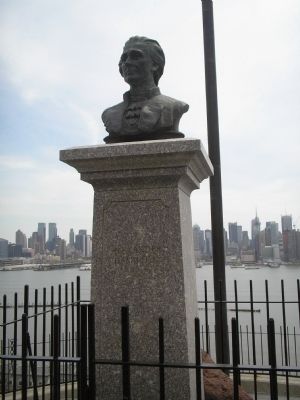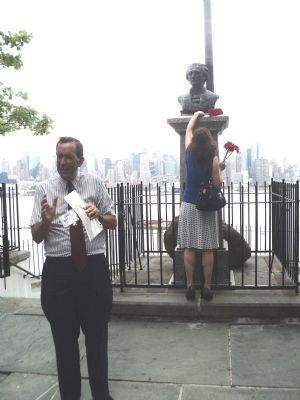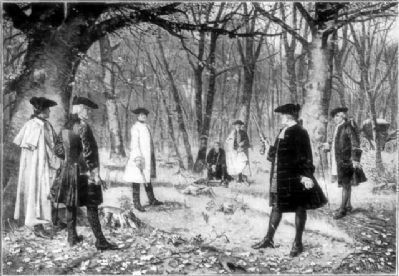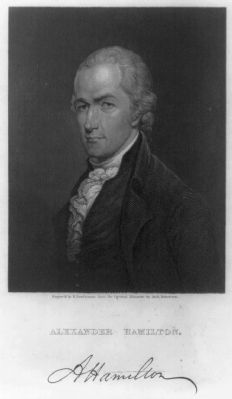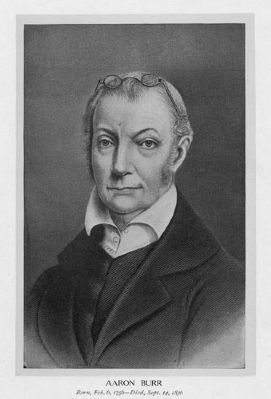Weehawken in Hudson County, New Jersey — The American Northeast (Mid-Atlantic)
The Hamilton-Burr Duel
July 11, 1804
Inscription.
The most famous duel in American History took place on this date at the dueling grounds in Weehakken, between political rivals, General Alexander Hamilton and sitting Vice President of the United States, Colonel Aaron Burr. Hamilton fell mortally wounded, and died the next day in New York City.
Tragically, Hamilton’s son Philip had also met his death here in a duel in 1801.
Dedicated on July 11, 2004, the 200th Anniversary of the Duel.
Erected 2004.
Topics. This historical marker is listed in this topic list: Patriots & Patriotism. A significant historical date for this entry is July 11, 2004.
Location. 40° 46.199′ N, 74° 1.032′ W. Marker is in Weehawken, New Jersey, in Hudson County. Marker is on Hamilton Avenue, on the left when traveling south. Touch for map. Marker is in this post office area: Weehawken NJ 07086, United States of America. Touch for directions.
Other nearby markers. At least 8 other markers are within walking distance of this marker. Death Rock of Alexander Hamilton (here, next to this marker); Weehawken Dueling Grounds (here, next to this marker); Highwood (about 300 feet away, measured in a direct line); Weehawken Korea and Vietnam Memorial (approx. 0.2 miles away); Eldorado Amusement Park (approx. ¼ mile away); Weehawken: Gateway to New York (approx. half a mile away); United States Marine Corps & Junior ROTC Plaza (approx. half a mile away); North Hudson Spanish American War Memorial (approx. half a mile away). Touch for a list and map of all markers in Weehawken.
More about this marker. The text is flanked by portraits of Hamilton and Burr.
Also see . . .
1. Duel At Dawn, 1804. “The relationship between Alexander Hamilton and Aaron Burr was charged with political rivalry and personal animosity. Alexander Hamilton, the nation's first Secretary of the Treasury, was the chief author of The Federalist papers advocating a strong central government. Burr represented the old Republican Party. His greatest accomplishment was achieved in 1800 when he was elected Vice President to Thomas Jefferson. Hamilton considered Burr
an unprincipled rogue. The antagonism between the two came to a head in 1804 when Hamilton thwarted Burr's attempt to gain re-nomination for Vice President as well as his bid to win the governorship of New York. Burr responded by challenging his antagonist to a duel, an invitation Hamilton felt compelled to accept.” (Submitted on April 25, 2008, by Bill Coughlin of Woodland Park, New Jersey.)
2. Alexander Hamilton and Aaron Burr's Duel. “Hoping that a victory on the dueling ground could revive his flagging political career, Burr challenged Hamilton to a duel. Hamilton wanted to avoid the duel, but politics left him no choice. If he admitted to Burr's charge, which was substantially true, he would lose his honor. If he refused to duel, the result would be the same. Either way, his political career would be over.” (Submitted on April 25, 2008, by Bill Coughlin of Woodland Park, New Jersey.)
3. The Alexander Hamilton Awareness Society. (Submitted on July 11, 2013, by Bill Coughlin of Woodland Park, New Jersey.)
Credits. This page was last revised on June 16, 2016. It was originally submitted on April 25, 2008, by Bill Coughlin of Woodland Park, New Jersey. This page has been viewed 5,489 times since then and 123 times this year. It was the Marker of the Week July 10, 2011. Photos: 1, 2, 3. submitted on April 25, 2008, by Bill Coughlin of Woodland Park, New Jersey. 4. submitted on July 11, 2013, by Bill Coughlin of Woodland Park, New Jersey. 5, 6, 7. submitted on July 9, 2011. • Craig Swain was the editor who published this page.

